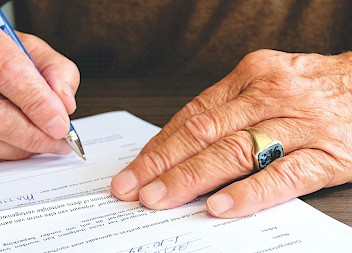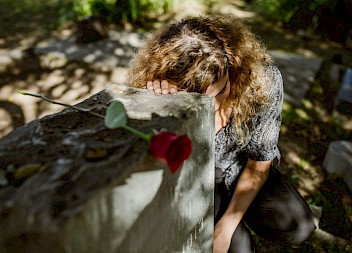Preparing for and attending an inquest into the death of a loved one is understandably a difficult time. If your loved one died as a result of medical negligence, our specialist inquest solicitors can help to guide you through the process.
If you would like to discuss a medical negligence claim and legal representation at an inquest, please don’t hesitate to contact our friendly team.
Do I need a solicitor at a medical negligence inquest?
If you are a close relative (parent, spouse, civil partner or child) of the person who died, you are considered a Properly Interested Persons (PIP) in the Coroner’s Court. As a PIP, you have certain rights, including the right to be legally represented. Since the process involved with a medical negligence inquest can be complex and distressing, it is helpful to have the support and guidance of an experienced inquest solicitor.
An inquest lawyer can assist in the preparation for an inquest and at the inquest itself. For many families, the possibility of an inquest can be intimidating, especially when the other people involved (such as doctors and nurses) are likely to have legal representation.
Medical Solicitors can obtain and examine the medical records before the inquest; this helps us to identify and ask the right, relevant questions of the witnesses and Coroner. We can also put questions to those responsible for the care provided, to try and get answers for the deceased’s loved ones.
In addition, we can advise on whether an independent medical expert should be instructed to provide their insights.
Inquest Legal Advice
What is an inquest?
An inquest is a public hearing held by a Coroner following a death. The purpose of the inquest is to answer four questions:
- Who has died?
- When did they die?
- Where did they die?
- How did they die?
What deaths will require an inquest?
Inquests take place for a number of reasons, including:
- where the cause of death is not clear
- where the death is a result of an accident at work or industrial disease
- where there are questions about medical treatment received by the deceased
Who decides if an inquest is needed?
A doctor or the police usually report a death to the Coroner, but the deceased’s loved ones can approach the Coroner’s office directly if they feel that a death should be reported. The Coroner will decide if an inquest is needed.
What is an Article 2 inquest?
If your loved one died as a result of medical negligence, the Coroner may hold an Article 2 inquest. Article 2 is an absolute right, meaning it is a right that can never be interfered with by the state. It lays out that the state cannot try to end somebody’s life, and they should protect you if your life is at risk and consider your life when making decisions that might put you in danger.
NHS hospitals, GPs and Trusts are all considered part of the ‘state’. Therefore, if medical negligence is at play, it may be appropriate for the Coroner to hold an Article 2 inquest.
Can a funeral be held before an inquest?
Whenever a death is referred to the Coroner, the Registrar of Births, Deaths and Marriages cannot issue a final death certificate. The Registrar must wait until the Coroner has finished any enquiries before registering the death. It is always best to contact the Coroner’s Office before making funeral arrangements as this process may take time.
In some cases, for example if the Coroner’s investigation is expected to take many months, the Coroner may allow the funeral to proceed before the inquest has been concluded. To do this, the Coroner would issue a Certificate of the Fact of Death (interim certificate).
What happens before the Coroner's inquest?
Before the inquest, a post mortem will usually be done to assist the Coroner in determining the cause of death. A pathologist will carry out the post mortem and submit a written report on their findings to the Coroner. Tests for toxins and other relevant tests may also be undertaken.
It usually takes three to four months before the Coroner can hold the inquest. However, it could be longer in complicated cases. Some Coroners have fast track procedures for simple cases.
Can family attend an inquest?
Yes, family members of the deceased can attend the inquest. The Coroner’s Court is an open court, so anybody is welcome to attend, including relatives and friends.
As a close family member, or a PIP, you may be asked to provide evidence during court. An inquest lawyer can help you prepare what you’re going to say or submit.
If you are concerned that the inquest will be too emotionally taxing, you do not have to attend. Alternatively, you can leave the room during parts of the inquest, for example when the pathologist provides their evidence. However, if you have been asked by the Coroner to attend, you will need to submit in writing why you do not wish to attend. The Coroner may excuse you.
Can children attend an inquest?
No, generally speaking, children under the age of 18 are not permitted to attend a Coroner’s inquest.
What happens during an inquest?
At the inquest, the Coroner will hear evidence from the family of the deceased. In medical negligence inquests, they will also hear evidence from the doctors and nurses, or midwives, involved in the deceased’s treatment. The Healthcare Trust responsible for the hospital where the death occurred will usually be represented by a lawyer if there is a possibility of criticism of the hospital. The opportunity to ask questions of the witnesses and make submissions to the Coroner is given to the family of the deceased, or their legal representative. At the end of the inquest, the Coroner will give answers to the four questions (‘who died?’, ‘how did they die?’, ‘where did they die?’ and ‘when did they die?’) and provide a verdict.
When is a jury required?
Most inquests are held without a jury. There are specific reasons when a jury will be called, for example if the case is very complex, or if the deceased has died in custody, or while detained under the Mental Health Act. In these inquests, it is the jury, and not the Coroner, who make the final decision and return the verdict.
How long will an inquest take?
The length of the Coroner’s inquest will depend on the complexity of the case. On average, an inquest should take about half a day. However, they can last anywhere from 30 minutes to multiple days.
Preparing for a medical negligence inquest
It’s completely normal to feel anxious ahead of an inquest. To help you prepare ahead of the day and feel slightly more at ease, we’ve put together this checklist of things to consider.
Before the inquest:
- Do you know how to get to the Coroner's Court? If you're planning to drive, you'll need to find out if and where parking is available. Plus, you'll want to get a idea of how long you'll be in Court for if you ned to buy a parking ticket.
- It can be a good idea to ask the Coroner's office if you can pop in to see the Coroner's Court before the inquest. This means you can find out where you will be sitting and, if you have to give evidence as a witness, where you will be standing.
- Find out if there is a family room that you can use throughout the day of the inquest.
- Staying hydrated throughout the inquest is important. Find out if water will be provided or if you can bring in your own bottle. You could also ask if there is a drinks machine. If so, you may want to bring change just in case.
- If you need a smoking break, is there somewhere nearby you can smoke?
- If it is a full day inquest, you may want to check where the nearest cafe is to the Coroner's Court. It's also worth checking if there's a park nearby where you can go and stretch your legs and walk off any tension you may be feeling.
- Many people find it helpful to bring a good friend (who is not emotionally involved with the inquest) to the hearing for help and support.
- It doesn’t hurt to learn some simple relaxation exercises to help you during the inquest. It is important to practice these exercises and relaxation techniques before the inquest so that you feel confident doing them. The simplest relaxation exercises consist of noticing your breathing and trying to breathe out for a longer period than you breathe in.
- If you have a solicitor or barrister representing you at the inquest, have you spoken to them to ensure that they know all the questions you wish to raise during the inquest?
- Triple check what time the inquest starts and what time you and your family should be at the Coroner's Court.
- Make sure you discuss with your solicitor whether or not a jury will be present during the inquest.
On the day of the inquest:
- Take tissues with you to the inquest and make sure that you can get to them easily.
- Boiled sweets or mints are often helpful as they help you feel more relaxed and give you something else upon which to focus.
- Agree with your solicitor or barrister what time you will meet them at the court. They may want to speak to you and your family before the inquest starts.
If you are asked to give evidence as a witness:
- There is a court ‘usher’ who helps the Coroner with various tasks, such as showing people in and out of the Coroner’s court. The usher will take you to the witness box and will ask you if you wish to give evidence on oath swearing on the Bible, another Holy Book, or if you wish to affirm that you will tell the truth. If you prefer to swear on a Holy Book, you will be asked to hold it in your right hand while you read the words from a card in front of you. If you affirm, you will read from a different card.
- You can take tissues to the witness box with you, and can use them, so don’t be afraid to do so.
- The Coroner will guide you in how to give your evidence. When you have finished, the Coroner may ask some questions. Your solicitor or barrister, and other solicitors or barristers, may also ask you questions. Your answers should always be directed to the Coroner and not the person who is asking the question.
- Try and speak loudly and clearly so that everyone can hear you. The inquest is taped, so if you speak too quietly, the microphones will not be able to pick up your voice.
- Ask the Coroner if you can give your evidence sitting down if you feel faint, dizzy, or have a condition which makes it difficult for you to stand up for a long time.
- If you become distressed and find it difficult to talk, ask the Coroner if you can take a break before continuing with your evidence. You may have to sit near the witness box and not talk to anyone during this break as you will still be on oath.
- You should avoid getting angry with the questioner, no matter what the questions are. It’s always best to answer politely and simply. If you feel that the question is inappropriate, or if you don’t understand it, tell the Coroner how you feel and the Coroner may then ask the questioner to explain why they are asking the question and how they believe it will benefit the inquest. The Coroner can disallow the question.
- The maximum time you would be in the witness box is probably an hour, and it is likely to be much shorter than this.
Listening to evidence:
-
Listening to evidence can be very distressing. If you feel you need to leave the room because you feel angry or upset, don’t worry. You can quietly make your way out of the Court. If there is a family room, you can go there and have a drink. Try to think about something entirely different. When you feel more collected, come back into the Court.
-
The pathologist is the doctor who examines dead bodies and tries to determine the cause of death; the Coroner may ask if you wish to leave the Court while he/she is giving their evidence. You may not want to hear what the pathologist has to say or see any of the photographs. This is your choice. If you wish to leave, ask someone to tell you when the pathologist has finished giving evidence so that you can come back into Court.
-
No matter what anyone says, do not get angry or make a loud comment and do not call anyone liar. Try not to be seen as influencing the jury, if there is one, by reacting to evidence given by witnesses. The Coroner may see this as inappropriate and ask you to leave the Court.
-
Try and stay as calm as you can throughout the inquest. If you feel you are unable to control your emotions, go take a walk to calm down.
-
Take a notebook and try to make notes of important points that you wish to remember.
After the inquest:
-
When the Coroner and the jury, if there is one, reach their verdict, you are bound to feel a range of emotions. Talk to your solicitor or barrister about what happens next.
-
If there are journalists present in the Coroner’s Court but you don’t want to talk to them, tell your solicitor and they will advise you on what to do.
- If there is a lot of press interest in your case, it may be a good idea to plan a short break, or even a holiday, straight after the inquest where the press cannot reach you.
- You may feel exhausted after the inquest has finished. Make sure you know how you are getting home and, if you are driving, are safe to do so.
- When you get home, it is very easy to re-live every moment of the inquest but try and do something to relax. Try and switch off from what has been a stressful day. Try not to think too much about what has happened; it will take time for everything to sink in.
- Think about arranging for someone to be there with you if you live alone.
- It might be an idea to think about counselling if you have not done so already.
Do they have inquests in Scotland?
There are no Coroner’s inquests in Scotland as the investigation of deaths is slightly different. The inquiries are the responsibility of the Procurator Fiscal’s office. Deaths come under two categories.
- Sudden
- Suspicious and unexplained deaths
The Procurator Fiscal enquires into all sudden deaths that happen in their jurisdiction. Their aim is to discover whether any criminal act has contributed, or caused the death, or find out whether the death has arisen from hazardous circumstances where action may prevent future deaths or injuries. Enquiries into circumstances that may suggest suicide are also taken on by the Procurators Fiscal.
Certain deaths in medicinal care are investigated, as are any deaths that may be related to a defect in a medicinal product. The Procurator Fiscal also investigates any death occurring in legal custody, whether in a police station or prison. Sudden deaths usually come to the attention of the Procurator Fiscal through a report from a doctor, the local registrar of births, deaths and marriages, or the police.
A Fatal Accident Inquiry (FAI) is a statutory public inquiry held in the Sheriff Court at the instance of the Procurator Fiscal. Where the death was caused by accident in the course of employment, or where the death occurred in legal custody, a FAI must take place. Crown counsel on behalf of the Lord Advocate may order a fatal accident inquiry if it is considered to be in the public interest, for any death that is suspicious, sudden, unexplained, or which has occurred in circumstances giving rise to serious public concern.
Medical Negligence Inquest Solicitors
If you need a medical negligence inquest solicitor, please don’t hesitate to contact our friendly team. We understand how complex and distressing the process can be, and appreciate it’s an experience most people haven’t dealt with before. We are here to listen to your story and will bring our experience and knowledge to ensure no stone is left unturned.
For additional support, please see a list of relevant organisations below.
Useful Support Organisations
CRUSE Bereavement Care
Tel: 0808 808 1677 (Helpline)
Website: https://www.cruse.org.uk/
CRUSE is a leading charity specialising in bereavement. Cruse has a wide range of leaflets and books available. Face-to-face and group support is delivered by trained bereavement support volunteers across the UK.
Childhood Bereavement UK
Tel: 0800 02 888 40 (Helpline)
Website: https://www.childbereavementuk.org/
Email: helpline@childbereavementuk.org
Childhood Bereavement UK provide confidential support, information and guidance to families and professionals. Their professionally trained bereavement support workers are available to take calls 9am-5pm Monday-Friday. You can also email their helpline or contact them via live chat on their website.
The Child Bereavement Network
Website: https://childhoodbereavementnetwork.org.uk/
Use the local support guide to find details of your local organisations that support bereaved children, whatever the cause of death. You just need to type your postcode or nearest town into the search box. Families can refer themselves directly to these free services, and other children’s professionals (teachers, GPs etc.) can get information, guidance and support too.
Some work with children on their own, others provide opportunities for them to meet others who have been bereaved.
The Compassionate Friends
Website: https://www.tcf.org.uk/
Tel: 0345 123 2304 (Helpline)
Email: helpline@tcf.org.uk
The Compassionate Friends supports bereaved parents and their families. They have a range of supportive leaflets you can download. Their helpline for bereavement support is open from 10am to 4pm and 7pm to 10pm every day.
UK Government
For information on what to do after a death, including how to register a death, how to tell the government about the death, and how to check if you’re eligible for bereavement benefits, please visit: https://www.gov.uk/after-a-death






